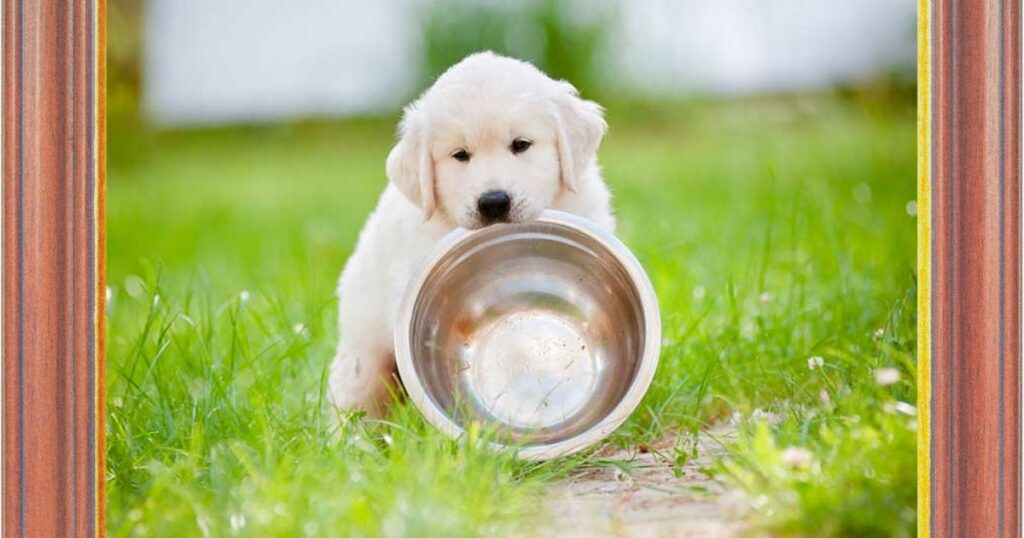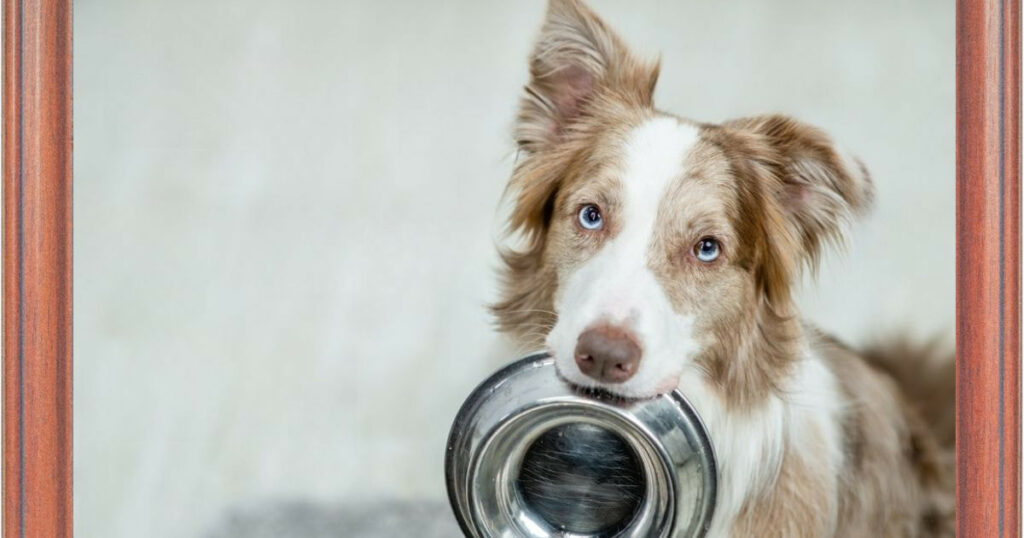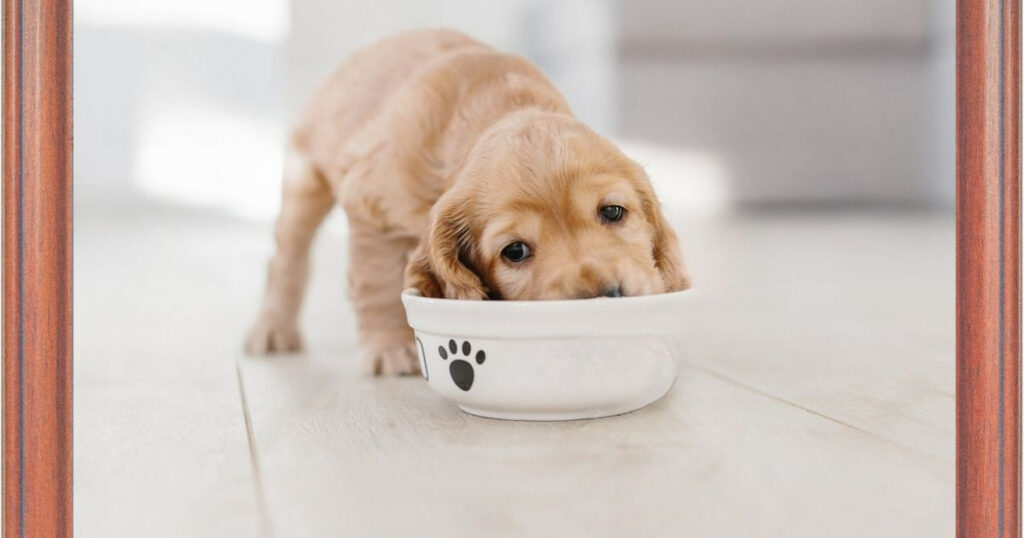As a devoted puppy owner, you may often find yourself bewildered by the unrelenting hunger of your furry companion. In this comprehensive article, we embark on a journey to uncover the intricacies of why your puppy always seems to have an insatiable appetite.
By delving deep into the factors that contribute to their constant hunger, we aim to equip you with valuable insights on how to effectively manage their dietary needs, ensuring their well-being and vitality.

The Science Behind Canine Appetite
The enigmatic world of a puppy’s appetite is rooted in the realms of science. To truly grasp why your four-legged friend seems to be forever famished, it’s essential to explore the inner workings of their metabolism and growth phases.
Puppies are in a constant state of transformation, undergoing rapid growth and development that demands a substantial influx of energy. As their tiny bodies evolve into sturdy frames, the demand for nutrients increases exponentially.
However, it’s not only their physical growth that plays a pivotal role in their hunger. Hormonal influences intricately choreograph the dance of appetite regulation within their systems. These hormonal signals serve as the puppet strings that guide the ebb and flow of hunger pangs.
Much like a finely tuned orchestra, the interplay of hormones orchestrates the rhythm of your puppy’s cravings.
As you venture further into this article, you’ll unearth the delicate balance between the science of metabolism and the art of hunger regulation.
Armed with this knowledge, you’ll be better prepared to decipher your puppy’s voracious appetite and embark on a journey to provide them with the nourishment they need, while also nurturing a healthier relationship with food.
So, let’s delve deeper into the fascinating world of canine appetites and unveil the mysteries that lie beneath their perpetual hunger.
Why is My Puppy so Hungry All of a Sudden?
Have you recently found yourself puzzled by the sudden surge in your once-content puppy’s appetite? It’s not uncommon for a furry friend’s hunger to seemingly skyrocket overnight. In this segment, we embark on a journey to decode the mysteries behind these abrupt shifts in appetite.
By unraveling the underlying factors responsible for your puppy’s newfound voracity, you’ll gain valuable insights into how to navigate this perplexing situation with care and understanding.
Whether it’s a temporary phase or a signal of something more profound, we’re here to shed light on the reasons behind your furry companion’s sudden, insatiable hunger.
What Are the Top Food-Obsessed Dog Breeds?
Some canine companions seem to possess an unquenchable passion for all things culinary. From stolen table scraps to fervent begging, their appetite appears boundless.
In this segment, we delve into the world of food-obsessed dog breeds, shedding light on those furry friends that have a natural inclination towards gastronomic delights. Discover if your pup’s breed finds itself on this list of epicurean enthusiasts.
Moreover, we’ll provide you with invaluable insights on how to effectively manage their insatiable hunger, striking a harmonious balance between indulgence and nutritional well-being.
So, whether your pup is a connoisseur of kibble or a fiend for treats, this exploration into food-centric breeds promises to be both enlightening and practical.

How Should I Handle a Hungry Puppy?
Dealing with a perpetually hungry canine companion can be an intricate puzzle to solve. Balancing their insistent demands for sustenance with their nutritional requirements can prove to be a real challenge.
Fear not, for in this segment, we arm you with practical strategies to navigate the labyrinth of your pup’s unending appetite. From setting structured mealtimes to incorporating enriching activities that satiate both body and mind, our advice aims to provide a holistic approach to addressing your dog’s hunger.
By understanding their cues and finding innovative ways to manage their cravings, you can ensure that your pup’s well-being remains the cornerstone of your efforts. Join us as we embark on a journey to embrace your Pupp’s hunger, steering it towards a path of fulfillment and health.
Can I Give My Puppy Too Many Treats?
Yes, it is possible to give your puppy too many treats. Treats should be given in moderation and should not make up a significant portion of your puppy’s daily caloric intake. Overfeeding treats can lead to weight gain, digestive issues, and an imbalance in their overall nutrition.
It’s important to choose high-quality treats that are specifically made for puppies and are appropriate for their size and age. Read the feeding guidelines on the treat packaging to understand the recommended portion sizes.
Additionally, treats should be given as rewards for good behavior or during training sessions, rather than as a substitute for their regular meals. Remember to factor in the calories from the treats when determining the appropriate amount of food to feed your puppy each day.
If you have concerns about your puppy’s treat consumption or their overall diet, it’s always a good idea to consult with your veterinarian for guidance and recommendations.
The Role of Spaying/Neutering
The journey of nurturing a healthy appetite is further influenced by the journey of spaying or neutering. This transformative procedure introduces hormonal changes that can subtly reshape your pup’s relationship with food.
In this segment, we navigate the intricacies of these hormonal shifts and their impact on your dog’s appetite.
Armed with knowledge, you’ll understand how to adapt their diet to harmonize with these changes, ultimately fostering a healthy weight and overall well-being.

How Do I Know If I Am Overfeeding My Puppy?
Portion control is an art form in itself, especially when it comes to a growing puppy. This segment provides insights into recognizing the signs of overfeeding – a challenge many pup owners encounter.
By deciphering these cues, you’ll become adept at determining the ideal portion size for your furry companion. With a grasp of the intricacies of portion control, you’ll pave the way for your pup’s optimal growth and well-being, ensuring that their relationship with food remains a nourishing and balanced one.
How Much Food Should I Give My Puppy Each Day?
The amount of food you should give your puppy each day depends on several factors, including their age, breed, size, and activity level. It’s best to consult with your veterinarian to determine the appropriate amount of food for your specific puppy. They can provide you with a feeding guide based on your puppy’s individual needs.
Additionally, the packaging of your puppy’s food may also provide general guidelines for feeding amounts based on their weight and age. Remember to monitor your puppy’s body condition and adjust the portion sizes accordingly to ensure they maintain a healthy weight.
How Many Times Per Day to Feed Your Puppy
The frequency of feeding your puppy depends on their age. Here is a general guideline:
- Puppies up to 3 months old: They have small stomachs and high energy levels, so they require frequent feeding. The veterinarian recommended feeding them 3 to 4 times a day.
- Puppies 3 to 6 months old: As their stomachs grow, you can start reducing the number of feedings to 3 times a day.
- Puppies 6 months and older: By this age, most puppies can transition to two meals a day. You can continue feeding them twice a day until they reach adulthood.
It’s important to note that these are general recommendations, and your veterinarian may suggest a different feeding schedule based on your puppy’s specific needs.

Daily Food Requirements for Large and Small Dog Breeds
Large Breed Puppy: Large dog breeds generally have higher energy requirements compared to smaller breeds. They require a balanced diet that includes high-quality protein, healthy fats, and essential vitamins and minerals. It is recommended to feed large dog breeds twice a day, with portion sizes ranging from 3 to 5 cups of food per day, depending on their specific needs. However, it is crucial to consult with your veterinarian to determine the exact portion sizes and adjust accordingly based on your dog’s age, weight, and activity level.
Small Breed Puppy: Small dog breeds have different nutritional needs compared to their larger counterparts. They require a diet that is rich in protein, healthy fats, and carbohydrates to support their metabolism and overall well-being.
Small dogs should be fed smaller meals more frequently throughout the day. The suggested feeding frequency for small dog breeds is three to four meals per day, with portion sizes ranging from 1/4 to 1 cup of food per day, depending on their size and activity level.
As always, it is advisable to consult with your veterinarian to determine the appropriate portion sizes and make any necessary adjustments based on your dog’s specific requirements.
Remember, providing the right amount of balanced nutrition is crucial for maintaining your dog’s overall health. Regularly monitor their weight and body condition, and consult with a veterinarian if you have any concerns or questions regarding their dietary needs.
Conclusion
The enigma of your puppy’s unceasing hunger unfolds through a myriad of factors, each requiring thoughtful consideration. From understanding their nutritional essentials to addressing the behavioral and medical facets, this comprehensive exploration navigates the labyrinth of their perpetual appetite.
By embracing this holistic approach and seeking the wisdom of experts, you’ll ensure your pup’s holistic well-being.
Through this journey, you’ll not only decipher their hunger cues but also cultivate a balanced, wholesome relationship with food – one that resonates with both nourishment and companionship.
You May Also Like





